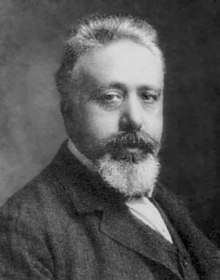Vito Volterra
Vito Volterra (born May 3, 1860 in Ancona , † October 11, 1940 in Rome ) was an Italian mathematician and physicist .
Volterra came from a poor background. At the age of 13 he was already dealing with the three-body problem . He studied at the University of Pisa , where he did his doctorate in hydrodynamics.
In 1883 he became professor for mechanics in Pisa, after the death of his teacher Enrico Betti he was given the chair for mathematical physics in Pisa, and in 1892 the chair for mechanics in Turin . In 1900 he became professor of mechanics in Rome.
In 1905 he was appointed senator of the kingdom, where he did not belong to any group. In 1904 he became a corresponding and in 1917 a foreign member of the Académie des sciences . In 1906 he was elected a corresponding member of the Göttingen Academy of Sciences and in 1908 a member of the German Academy of Sciences Leopoldina . Also in 1908 he became a corresponding member of the Russian Academy of Sciences in St. Petersburg ; since 1926 he was an honorary member of this academy. During the First World War he worked for the Italian army and participated in the development of airships . He came up with the idea of using incombustible helium as a carrier gas instead of hydrogen .
From 1922 he became involved in the opposition to the fascists . When he refused to take the oath of allegiance to the fascist regime of Benito Mussolini in 1931 , he was forced to leave the university. Because of his refusal to take the oath, he was also expelled from the Accademia Nazionale dei Lincei in 1935 , of which he had been a corresponding member since 1888 and a full member since 1899. He spent the last years of his life abroad, mainly in Spain and France, but returned to Rome shortly before his death.
His research dealt in particular with analysis . His work on integral equations is best known , so a special type is named after him, the Volterra equation . He also dealt with population dynamics in predator-prey relationships . The laws he found, which he formulated independently of Alfred J. Lotka , are named after him the Volterra rules (formerly also: Volterra laws ).
In 1911 Volterra was elected to the National Academy of Sciences and in 1913 as an Honorary Fellow in the Royal Society of Edinburgh . In 1928 he gave a plenary lecture at the International Congress of Mathematicians (ICM) in Bologna ( La teoria dei funzionali applicata ai fenomeni ereditari; Application of the Theory of Functionals in Genetics), also before in 1900 at the ICM in Paris (Betti, Brioschi, Casorati - Trois analystes italiens et trois manières d'envisager les questions d'analysis) and 1908 in Rome (Le matematiche in Italia nella seconda metà del secolo XIX).
The asteroid (14072) Volterra , discovered on May 21, 1996, has been named after him since 2000.
literature
- Laurent Mazliak & Rossana Tazzioli: Mathematicians at war. Volterra and his French colleagues in World War One (= Archimedes. 22). Springer-Verlag , Dordrecht et al. 2009, ISBN 978-90-481-2739-9
- Karl-Eugen Kurrer : The History of the Theory of Structures. Searching for Equilibrium , Ernst & Sohn 2018, p. 1074f (biography), ISBN 978-3-433-03229-9 .
Web links
- Literature by and about Vito Volterra in the catalog of the German National Library
- John J. O'Connor, Edmund F. Robertson : Vito Volterra. In: MacTutor History of Mathematics archive .
- Page at the Historical Archives of the Italian Senate
Individual evidence
- ^ List of former members since 1666: Letter V. Académie des sciences, accessed on March 13, 2020 (French).
- ↑ Holger Krahnke: The members of the Academy of Sciences in Göttingen 1751-2001 (= Treatises of the Academy of Sciences in Göttingen, Philological-Historical Class. Volume 3, Vol. 246 = Treatises of the Academy of Sciences in Göttingen, Mathematical-Physical Class. Episode 3, vol. 50). Vandenhoeck & Ruprecht, Göttingen 2001, ISBN 3-525-82516-1 , p. 249.
- ↑ Vito Volterra's membership entry at the German Academy of Natural Scientists Leopoldina , accessed on June 18, 2016.
- ^ Foreign members of the Russian Academy of Sciences since 1724: Volterra, Vito. Russian Academy of Sciences, accessed April 19, 2020 (Russian).
- ^ Fellows Directory. Biographical Index: Former RSE Fellows 1783–2002. (PDF file) Royal Society of Edinburgh, accessed April 19, 2020 .
- ↑ MPC
| personal data | |
|---|---|
| SURNAME | Volterra, Vito |
| BRIEF DESCRIPTION | Italian mathematician and physicist |
| DATE OF BIRTH | May 3, 1860 |
| PLACE OF BIRTH | Ancona |
| DATE OF DEATH | October 11, 1940 |
| Place of death | Rome |
